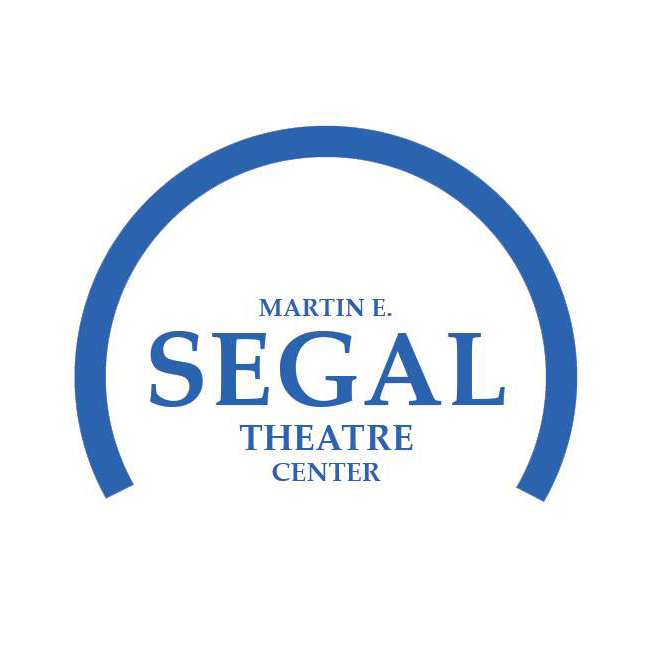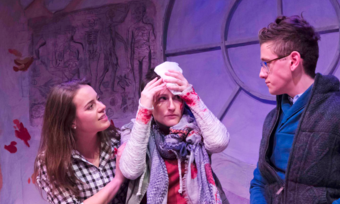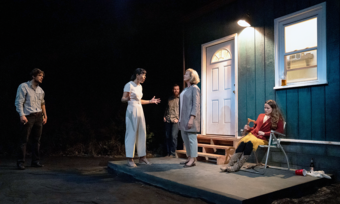Livestreamed on this page Monday 4 December 2017 at 6:30 p.m. EST (New York) / 5:30 p.m. CST (Chicago) / 3:30 p.m. PST (San Francisco).
Add to Calendar
The Italian Playwrights Project 2017
The Martin E. Segal Theatre Center and Umanism NY presented The Italian Playwrights Project 2017, livestreamed on the global, commons-based peer-produced HowlRound TV network at howlround.tv on Monday 4 December 2017 at 6:30 p.m. EST (New York) / 5:30 p.m. CST (Chicago) / 3:30 p.m. PST (San Francisco).
After the success of the first edition of the Italian Playwrights Project (IPP, 2015/16) and a special evening dedicated to the work of Stefano Massini (Teatro Piccolo, Milan) IPP, once again the Segal Center will collaborate with Valeria Orani and Umanism NY. The initiative will bring some of the brightest, innovative, and most engaging playwrights from Italy to New York to develop their pieces through translation into English and public readings of the work. The Italian Playwrights Project plays an important role in introducing contemporary writing from Italy to the US. The project restarted an artistic dialogue between the two countries which has been sporadic over the last 30 years.
Participants of 2015/16 IPP included Lucia Calamaro, Daria Deflorian & Antonio Tagliarini, Stefano Massini, Fausto Paravidino, and Michele Santeramo. For the first time US playwrights will also be presented in Rome, Italy on December 16th, 2017.
This year’s special evening will include excerpted readings from The Horizon of Events by Elisa Casseri; My hero by Giuliana Musso; A Notebook for the Winter by Armando Pirozzi; and The Great Walk by Fabrizio Sinisi.
Excerpts directed by Marc Atkinson, Sara Rademacher, and John Gould Rubin.
Followed by a panel discussion moderated by Frank Hentschker with the Italian playwright Elisa Casseri and other participants.
Supported by the Italian Cultural Institute of New York (Giorgio Van Straten, Director). The upcoming anthology of New Plays from Italy from the 2015 IPP has been translated thanks to a grant by the Italian Ministry of Foreign Affairs and International Cooperation.



About the plays:
The Horizon of Events
by Elisa Casseri
Olga is stuck in a studio apartment, which has a wall with many doors and cupboards, a front door which doesn’t open and no windows: she cannot figure out what has happened, she only knows that she cannot escape. When she tries to open one of the doors on the wall, she immediately comes back from another one and continues to stay there. At some point, however, she realizes that time is messed up and that every time she leaves, she enters a different time of her life.
It turns out that the doors are a black and white hole device, which draws her own personal story into the room, including events and people she loves, as if she had been kept captured in a maze of memories.
Marco is her boyfriend but sometimes he isn’t, her father is alive but later dead, her mother left when she was a little girl but she is suddenly back. Olga struggles to understand and does not know what reality is and what she can do to change what happened and what didn’t happen. She cannot surrender to the real time, to past events, to those journeys into a grief which is too true to be science fiction.
She learnt from her father that the edge of the black holes is the horizon of the events, because it simply moves away as we get closer, which is how future works, too. You cannot fight against future by giving up on the present, you cannot deny present by locking yourself inside the past. So, when reality materializes and Olga realizes that her father is dead, that Marco has decided to leave his country and when her mother tries to ask forgiveness, she understands that the only way to overcome grief is to feel it.
So she runs away in order to learn how to get back.
My Hero
by Giuliana Musso
Mio Eroe (My Hero) is made up of three distinct monologues. The protagonists of the monologues are three mothers of as many Italian soldiers who took part in the International Security Assistance Force (ISAF) mission in Afghanistan during the years 2008-2010. Two of these mothers lost their son in battle. The three women are very different from each other for social extraction, geographic origin, cultural level and personality, but they share the experience of having a soldier’s son. Mothers’ talk interlaces memories of childhood, stories of tragic events, considerations on their child’s choices. Characters are inspired by existing people and real-life events.
A Notebook for the Winter
by Armando Pirozzi
Un quaderno per l’inverno (A Notebook for the Winter) is a two-actor-piece which in three acts and tells the story of an introvert professor of literature who finds a burglar on his way back home. The knife-wielding burglar wants something unexpected from him: it is a question of life or death. During the entire night the two characters talk, exchange ideas, feelings, ask painful questions out of hope and desperation, in a completely new and unexpected atmosphere. They will meet again years later, both affected by that night. Although their personal memory of that night is different, yet it may have triggered a change in both of them, by offering a further comprehension and awareness of each other. The key idea is based on the power of writing as a way to directly impact reality: the wonder resilience of poetry is not seen as a literary exercise, but rather as a vibrant force which affects life.
The Great Walk
by Fabrizio Sinisi
The president of the International Monetary Fund, Frederic Jean-Paul, is arrested and kept in an anonymous New York police station: he’s accused of sexual violence inflicted on a waitress. His two bizarre jailers, Donald and Frank, have been ordered to guard the prisoner until the following morning, when he will be brought to a safer location. However, things don’t go as planned: Jean-Paul shows signs of an inexplicable anxiety; Barbara, Jean-Paul’s wife, and Marcel Labiche, his lawyer and secretary of the French Socialist Party, soon break into the police station. Moreover, the two jailers seem to embody something more terrible than two simple guards. Elements of a bigger affair emerge during this night, an affair that does not simply concern violence between individuals, but also among nations, political subjects, and groups of power. Inspired by well-known international news, The Great Walk tries a “cotemporary” recycling of conventional dramatic traditions linked to tragedy: faithful to the dictates of the Aristotelian unities of time and place, it’s composed in the regular verses of the Italian metrics (hendecasyllabic, sectarian).

Elisa Casseri (born in Latina in 1984) has a degree in mechanical engineering. She published Teoria idraulica delle famiglie, Elliot Edizioni, in 2014 and a year later she won the 53rd edition of the theatre award Premio Riccione with the text L’orizzonte degli eventi. She publishes the blog “Memorie di una bevitrice di Estathè» and contributes to the “Nuovi Argomenti” magazine.

Giuliana Musso is an actress and playwright. Born in Vicenza in 1970. Lives in Udine. Since 2001 she has been writing and producting narrative and investigative works; her work is characterized by its blend of oral testimony, comedy and lyricism. Her first trilogy was about the “fundamentals” of life, birth, sex and death: Born in the Home (2001), Sexmachine (2005) and Tanti Saluti (2008). In 2009 she began an exploration of the history and structure of the patriarchy with La città ha fondamenta sopra un misfatto (2010), inspired by Medea; Stimmen by Christa Wolf, La Fabbrica dei preti (2012) on Life and Training in Italian seminaries before Concilum Vat II; and Mio Eroe (2016), the contemporary war in the voices of some military mothers whose sons died in Afghanistan. Other writing and productions were: Indemoniate, on a case of female collective hysteria in Friuli at the end of the nineteenth century; La base, a theatrical investigative laboratory on the construction of the US military base “Ederle 2” in Vicenza; Dreams, a dance-show on over-indebtedness. Since 2008 her production house is La Corte Ospitale, Rubiera (RE).
Awards:
Critic Award 2005
Cassino Off Award 2017 for Mio Eroe
Hystrio Prize for Dramaturgy 2017
Publications:
Nati in casa video was published in the “Teatro in- Civile” series, Ed. The Manifesto. Nati in casa is published in the anthology “Senza Corpo” and Ed. Minimum Fax. The dvd of Tant Saluti is published in “Storie Necessarie” Ed. Rai Cinema and Argot Productions. La città ha fondamenta sopra un misfatto is published in the anthology Donne che non seguono il copione Ed. Aracne.

Armando Pirozzi was born in Naples on the 4th of October 1973. He wrote and directed “Cronache da un Tempo Isterico” which obtained the special production award “Nuove Sensibilità 2008” and went onstage during the Turin Teatro a Corte Festival of 2009 (SE POSSIBILE METTEREI IL MESE VICINO ALLA DATA, ANZICHE’ ESTATE). His piece “La Prima della Sera” opened the Theatre Fringe Festival in Naples, Italy, in 2009. His following piece “Attraverso il Furore”, was written on Meister Eckhart and directed by Massimiliano Civica; it was premiered at the Armunia – Inequilibrio Festival of Castiglioncello in July 2011. “Soprattutto l’Anguria” was shortlisted at Premio Riccione of 2009 and then brought onstage by Massimiliano Civica during the Romaeuropa Festival. His 2013 work “Hard Times” was shortlisted at Premio Riccione. “Altamente Volatile” was written in 2015 for the school recital for the end of his third year at the Accademia d’Arte Drammatica Silvio D’Amico. It was directed by Massimiliano Civica. Pirozzi wrote “Il Cielo in una Stanza”, with Emanuele Valenti in 2016, who brought it onstage with the troupe Punta Corsara at the Theatre Festival in Naples, Italy. His latest piece “Un Quaderno per l’Inverno” premiered at the Fabbricone theatre in Prato, under the direction of Massimiliano Civica, in March 2017.

Fabrizio Sinisi was born in Barletta in 1987. Playwright, poet, and translator, in 2012 he debuted as a theater author with “La grande passeggiata” for Federico Tiezzi’s direction and Sandro Lombardi’s acting. As for poetry, he published “La fame” and “Contrasto dell’uomo e della donna”, which were presented during the XXVII edition of the Salone internazionale del Libro di Torino, and for which he was mentioned in the 2015 Carducci Prize. In 2016, his “Natura morta con attori” debuted at the Piccolo Teatro in Milan, while his “Agamennone” was part of the season at the Teatro Stabile in Turin; in 2016 his “Cabaret D’Annunzio” debuted at the National Croatian Theater in Rijeka. In 2017, his “La valigia di Ravel” was produced the Maggio Musicale Fiorentino, making Sinisi the youngest author represented during the course of the prestigious Tuscan event. His texts have already obtained the nominations for the most important dramaturgical awards in Italy, among which the Riccione Tondelli Prize, the Platea Prize, and the Testori Prize. In 2010, at just 20 years old, he became dramaturg of the Compagnia Lombardi-Tiezzi in Florence and of the Teatro Laboratorio della Toscana, as well as professor of Dramaturgy at the Scuola di Scrittura Flannery O’Connor in Milan. During the three-year period of 2018-2020 he is resident dramaturg at the Centro Teatrale Bresciano. For years, he has been collaborating with the main directors of Italian theater. His works have been staged in Croatia, France, Great Britain, Greece, Romania and Switzerland.
US Advisory Board:
Keith Josef Adkins (Artistic Director, New Black Fest)
Marvin Carlson (Professor of Theatre, The Graduate Center, CUNY)
Anne Cattaneo (Dramaturg and Director, LCT Directors Lab, Lincoln Center Theatre)
Migdalia Cruz (US Playwright)
Mia Chung (US Playwright)
Marco Calvani (Italian Playwright and Director based in New York)
Frank Hentschker (Segal Center, The Graduate Center, CUNY)
Kate Loewald (Artistic Director, The Play Company)
Bonnie Marranca (PAJ, Publisher Performing Arts Journal)
Terry Nemeth (Publisher, Theatre Communications Group, Inc.)
Italian Advisory Board:
Simone Bruscia (Writer, Producer, Director of Riccione Teatro)
Roberto Canziani (Theatrical Critic for Il Piccolo, University of Udine
Graziano Graziani (Journalist, Radio Conductor RAI Radio 3 – Italy)
Stefano Massini (Playwright)
Valeria Orani (Producer, Artistic Director Umanism NY – 369gradi Italy)
Debora Pietrobono (Italian dramaturgy and dramatic critic)
Giulia Delli Santi (Director of Teatro Pubblico Pugliese, Apulia Theatre Network
About HowlRound TV
HowlRound TV is a global, commons-based peer produced, open access livestreaming and video archive project stewarded by the nonprofit HowlRound. HowlRound TV is a free and shared resource for live conversations and performances relevant to the world's performing arts and cultural fields. Its mission is to break geographic isolation, promote resource sharing, and to develop our knowledge commons collectively. Participate in a community of peer organizations revolutionizing the flow of information, knowledge, and access in our field by becoming a producer and co-producing with us. Learn more by going to our participate page. For any other queries, email [email protected], or call Vijay Mathew at +1 917.686.3185 Signal/WhatsApp. View the video archive of past events.
Find all of our upcoming events here.











Comments
The article is just the start of the conversation—we want to know what you think about this subject, too! HowlRound is a space for knowledge-sharing, and we welcome spirited, thoughtful, and on-topic dialogue. Find our full comments policy here